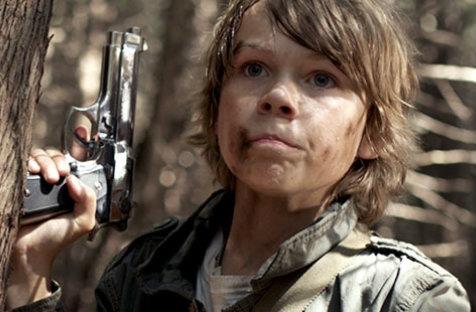Since 2007, the Melbourne International Film Festival has catered not only to the city’s many cinephiles, but to the eager minds destined to become the next generation of filmmakers and movie-goers. In the aptly-titled Next Gen program, the festival presents a diverse range of features designed to stimulate and engage younger audiences, both in the language of international cinema, and with socially-relevant, age-appropriate issues. Of course, the mature and intelligent program also appeals to older viewers but is enthusiastic in its embrace of youth-oriented topics and perspectives. As the festival approaches, we preview a selection of the MIFF Next Gen highlights.
A Werewolf Boy
Horror lurks in Korean fable A Werewolf Boy (Neuk-dae-so-nyeon) although not the type its title intimates. Jo Sung-hee’s film offers his spin on one of the most tried and tested tales – that of a beauty, and a beast, framed by a grandmother’s (Li Young-lan) recollection of her farmhouse upbringing 47 years earlier. As a teen (played by Park Bo-young, Don’t Click), she stumbled across a boy (Song Joong-ki, Penny Pinchers) wild in appearance and demeanour, yet saw kindness and caring beyond his gruff exterior.
Writer/director Sung-hee’s follow up to 2010’s End of Animal may seem incongruous given that film’s ferocity of material and approach; however with a lightness of touch he shows his skill in vastly dissimilar territory, proving thoughtful in his dissection of the relationship that blooms in difference, and confident in his handling of youthful faith against the odds. Though crafted as a young adult-friendly paranormal romance, A Werewolf Boy succeeds in its earnestness, exceeding the confines of the increasingly popular genre.
Bekas
Not every kid wants to be a superhero; Zana (Zamand Taha) and Dana (Sarwar Fazil) just want to be Superman’s friends. The time is 1990, and the place is Iraq, under Saddam Hussein’s rule, where the orphaned Kurdish siblings beg and borrow for their meagre experience. Then, in a stolen glance through the dirty window of a cinema, they discover Christopher Reeve and the character that established his fame. Suddenly, they pine for his company to improve their plight, their youthful dream inspiring a cross-continental adventure to find their idol in the idyllic land they call America.
Adapting his 2010 short of the same name, writer/director Karzan Kader (The Last Four) crafts a deeply moving contemplation of life under oppressive circumstances, yet never wallows in misery. Instead, the reality of a dictatorial regime is just that, providing an obstacle for his resourceful, determined heroes to conquer. The scenario is slight, but everything soars with spirit – from the charismatic performances of the leads, returning to the roles, to the expansive backdrop that teases with its vastness, to the tonal balance of hope and hostility. Tension seethes as the feature reaches towards its conclusion, as does passion; in fitting with its super symbol, the outcome turns boys into heroes.
Blackbird
When police arrive in the deep of the night with a warrant to search Sean Randall’s (Connor Jessup, TV’s Falling Skies) house, his future is determined: an arsenal of loaded guns, an anti-social online tirade, and a history of unapproved behavior – a penchant for black clothing, alternative music and firepower, and an obsessive fascination with the popular, pretty girl who encourages his advances – convincing the community of his unquestionable guilt. ‘Why are you so angry?’ they ask. ‘What did the world do to you?’ The C-word – Columbine – is mentioned, and becomes his nickname in prison.
Yet what this 16-year-old outcast may or may not have done had law enforcement not intervened is not the point of Jason Buxton’s multi-award-winning first film; why others are so quick to judge, and what happens when they make their uninformed but unshakeable opinions known – both before and after his arrest – is at the core of a damning indictment not of school shootings, but of group mentalities. The overtness of Blackbird’s message is heavy-handed amidst its emphasis on realistic imagery, but it is also effective, plunging audiences into the social and emotional realities of mass hysteria.
Capturing DadDeath – its advance, inevitability and finality – lingers over the land of the living; however its presence can impart wisdom as well as dread. In Capturing Dad (Chihi o tori ni), sisters Hazuki (Erisa Yanagi, Snowchild) and Koharu (Nanoka Matsubara, in her first film role) come to this understanding after the most unusual of road trips, a journey of awkwardness that becomes a chance for redemption. At their mother’s (Makiko Watanabe, Playback) insistence, the siblings travel across the country to farewell their long-estranged and bitterly ill father as he counts down his final days. Alas, his prolonged absence continues, but closure springs from the unexpected.
In only his second film, writer/director Ryota Nakano (The Sparking Amber) creates an elegant exploration of emotion, predicated upon memories made, lost and lasting a lifetime. Yet, in his astute understanding of the comic potential of even the most heartbreaking of scenarios, he also crafts a feature filled with amusement and optimism. With languid cinematography that amply essays the rural Japan setting, and immersive performances from the young cast, the coming-of-age effort becomes of a sustaining – but never satirical – exploration of the healing power of routine gestures. An unflappable sense of merriment may seem out of place, but in the film’s mellifluousness it remains polished, poetic and poignant.
I Declare War
The rules of war are simple: generals pick teams according to preference, those unfortunate enough to be shot must wait before rejoining, those fatally hit by grenades can take no further part in the fray, and securing the enemy’s flag – by any means possible – results in a resounding victory. Of course, not all wars are created equal, with the one in question taking place in backgrounds and playgrounds, rather than on battlefields. In I Declare War, the combat stems from 12-year-old children enjoying a spirited game of Capture the Flag with their friends, each imagining that they are real soldiers.
Writer/director Jason Lapeyre (Cold Blooded) and co-helmer Robert Wilson (Dead Mary) mine and match their characters’ enthusiasm, styling the action as a satirically serious appropriation of the realities of conflict – the weaponry (sticks become guns), the phrasing (chats about girls are handled with life or death importance), the attitude (childhood animosities provide deep-seeded motivations for attacks), and the carnage (of the physical and emotional kind) included. Fun radiates from the darkly humorous film, as it evokes the awe of youthful imaginations and excites with its impressive child performers; however audacity also emanates from its astute survival-of-the-fittest observations.
Moon Man
The cultural mythology of the Earth’s only satellite made for an enchanting tale in Tomi Ungerer’s 1967 children’s picture book Moon Man (Der Mondmann); now, writer/director Stephan Schesch, co-helmer Sarah Clara Weber and co-scribe Ralph Martin (Little Amadeus) adapt the adorable adventure for the screen. Embellished with affectionate references to the modern space exploration exploits that post-date the source material, the cheerfully-animated and jovially-toned feature engages in its nuanced narrative of understanding and acceptance, as its namesake tries to find his place in the world.
Lonely in his post looking down on mankind, and unaware of the joy his presence brings to children worldwide, Moon Man (Katharina Thalbach, Forgotten) descends in search of company. Those still imbued with wonder greet him with warmth, including eccentric inventor Bunsen van der Dunkel (Thomas Kästner, Rund um die Uhr); the less engaged brand him an extra-terrestrial invader, such as the empire-hungry president of the planet (Ulrich Tukur, Zettl). There’s much fun to be had in Moon Man’s ample hijinks, the film’s sense of awe evident in every offbeat turn. Many family-friendly offerings have soared into space before, but few have done so with such evident exuberance, in an unassuming but never unsatisfying cinema experience for all ages.
The Day of the Crows
Within the richly-textured, gorgeously-drawn world of Jean-Christophe Dessaint’s The Day of the Crows (Le jour des corneilles), a serving of hardship becomes a slice of hopefulness. Layered in the right amount of supernatural spirituality – akin to Studio Ghibli’s dalliances with things beyond the ordinary – the sweet and sincere adaptation of Jean-François Beauchemin’s novel introduces an gruff, grief-stricken father (Jean Reno, Alex Cross), a lovely, lonely boy (Lorànt Deutsch, You Will Be My Son), and the stubborn refusal to acknowledge emotion that shapes them into the role of outcasts.
The latter follows the former’s every move in their wild life in the forest, until an injury forces the duo to seek the solace of civilization. Though the townsfolk scream and stare, a caring doctor (the late French filmmaker Claude Chabrol) and his curious daughter (Isabelle Carré, Looking for Hortense) show kindness that sparks the son to seek more from his existence, standing up to his dismissive dad to reclaim the last sparks of their family bond. The eye-catching, intricate imagery competes for attention with the beautiful, bittersweet story, yet the dueling displays are to the detriment of neither. Indeed, in aesthetic and narrative, the film engages with colour and charm in its message of acceptance.
Touch of the LightThere’s a subtlety to Chang Jung-chi’s Touch of the Light (Ni guang fei xiang), a softness that shimmers in its slender tale of two artists struggling to succeed in trying circumstances. Huang Yu-siang (playing a mostly fictionalized version of himself in his first feature role) is a pianist who refuses to let his blindness hinder his musical studies; Xiao Jie (Sandrine Pinna, The Chrysalis) is a dancer crippled by the debts of her spendthrift mother. When their paths inevitably cross in a routine act of kindness, their misfortunes are lessened as they are shared.
Yet, the sweet and sensitive nature of the heartfelt romance proves earnest and emphatic rather than manipulative and manufactured, its simplicity heightening its tender emotion. The dual leads impress in expressive performances that not only capture the trouble of their characters, but their tenacity; however it is the deft and delicate direction by Jung-chi that turns a seen-before story into an authentic human drama. Indeed, returning to Yu-siang’s life after short The End of the Tunnel proves fortuitous for all involved, with Pinna also a veteran of the story. What their second combined effort lacks in surprise, it boasts in heart, all accompanied by a quietly rousing marriage of music and movement.
Valentine Road
‘We all learned a lot about life through this,’ sagely surmises one of the onlookers of the events that rocked an ordinary Californian classroom on February 12, 2008. This may be the most optimistic assessment of the school shooting of Lawrence King by Brandon McInerney, a calculated execution motivated by an innocent show of affection that evoked an uncomfortable, anger-filled reaction. Yet the fortitude the statement displays is telling, a trait matched by filmmaker Marta Cunningham. In the wake of tragedy, those left standing vowed to ensure such events didn’t occur again; in Valentine Road, the first-timer shows why they fight.
Through interviews with peers, teachers, friends and family, as well as ample photographs, surveillance footage and accounts of celebrity reactions, Cunningham compiles a portrait of the plights of the victim and the perpetrator – before and after their fates were forever altered. Their parallel paths do not go unnoticed as troubled upbringings lead to traumatised teen years; indeed, it is the complexity of the case that the documentary cultivates. It is impossible not to be moved by the facts as they unravel, or to be infuriated by the rhetoric. Of course, it is the details that linger, in a film tailor-made to inform debate.
What Richard Did
In his potent exploration of the fragility of youth, filmmaker Lenny Abrahamson (Dublin 26.06.08: A Movie in 4 Days) builds up and tears down his titular protagonist. His carefully calculated feature, adapted by Malcolm Campbell (Shameless) from Kevin Power’s novel, is comprised of two distinctive halves – but the director’s devastating power resides in his ability to turn the before and after of his lead character’s actions into a commanding and compassionate morality tale of cause and effect.
A popular and pleasant teen with a large circle of friends, Richard (Jack Reynor, Dollhouse) is the type of friend who earns praise for saving a girl from lecherous advances, and the type of guy who placates his pal’s parents when he takes their son on an impromptu getaway. Good fortune follows his every amiable move, until an evening of inebriation and envy leads to an ill-thought-out act of tragedy. In coping with his culpability, Richard is forced to confront his duality, a hard and harrowing journey into his inner psyche. In conveying the struggle of a young man pondering nature versus nurture, the brooding Reynor and his brazen director both excel, resulting in a film brimming with promise for things to come.
Melbourne International Film Festival
25 July – 11 August
miff.com.au
Actors:
Director:
Format:
Country:
Release:





